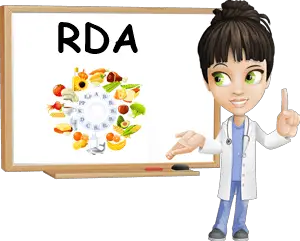The American abbreviation RDA stands for Recommended Dietary Allowance and represents the daily intake of essential nutrients the body requires in order to keep us in good health and prevent deficiencies and illness while functioning at optimal capacity. More specifically, RDA refers to a minimum everyday intake of vitamins and minerals from food sources. These dietary recommendations are addressed to over 97% of the healthy population and based on an estimated energetic intake of 2000 kcal (kilocalories), approximated for an average adult.
Nevertheless, nutritional needs may differ immensely from one individual to another and there are cases when the RDA system provides insufficient nutrient intake. Existing diseases, malabsorption problems, blood loss, insufficiently nutritious food options, generally poor dietary habits such as a high intake of processed foods, poor lifestyle habits that promote nutritional deficiencies and disease (smoking, alcohol consumption), certain medicines etc. are only a few of the reasons why many people do not meet their recommended daily nutrient intake or RDA.

Having scientifically researched nutrition references is good because it prevents people from having a dangerously high or life-threatening low intake of vitamins and minerals. Nevertheless, every individual is biologically different and therefore may require higher or lower amounts of certain nutrients. Even more, when we take into account various genetic dispositions, disease and old age risks, we are faced with the fact that the proposed nutritional requirements differ significantly from actual requirements.
Some people need to be careful with their iron intake, others with their chromium. Older people might sometimes need double doses of some nutrients such as some B vitamins and so might those living or working in a stressful environment. Anyone with depression, anxiety and high stress-lifestyles benefit from an increase in their daily magnesium intake, while anemic individuals require both iron, preferably from animal sources, and vitamin C to optimize iron absorption. Because some nutrients optimize the absorption and proper use of other nutrients.
Bad lifestyle choices such as smoking and drinking alcohol greatly affect the absorption of essential nutrients and daily requirements. For example, smoking and eating a lot of sugar can deplete the body of vitamin B1 (thiamine). Stress raises magnesium and B vitamins daily intake significantly, while taking medication, especially antibiotics, interferes with the absorption of some nutrients, production of others at intestinal level, causing us to have higher requirements. Blood coagulation medication or surgery alter daily vitamin and mineral requirements as well. Any nutrient deficiency requires us to increase the intake of the nutrient our body is missing to restore adequate levels, and so on.
Considerations
Although the RDA is a general reference system for a daily dietary intake of vitamins and minerals, it does not necessarily mean we are getting enough nutrients by ensuring that specific intake. Similarly, certain eating habits may supply us with too much of one nutrient or another. Nevertheless, the RDA is a not so rough guide to how much of what you should be eating to keep healthy and prevent any possible deficiencies and associated diseases. It is good to relate to it, but if you feel your are not meeting you nutritional needs, you can always check with your doctor and together try to understand your body’s individual nutritional requirements. DRI is a nutrition reference system known as Dietary Reference Intake.
